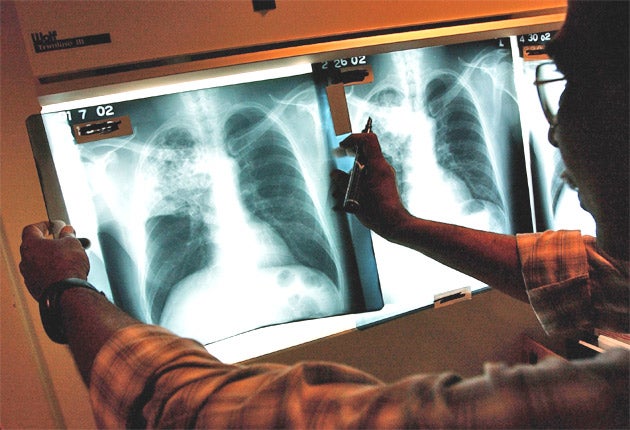Experts urge TB vaccine for all London children

All babies born in London should be vaccinated against tuberculosis to protect them against the growing threat from the disease, public health specialists say.
Almost 45 per cent of all childhood TB cases in the UK occur in the capital and the rising incidence has now passed the threshold where routine immunisation should be introduced, according to experts from the Health Protection Agency.
Tuberculosis is often thought to be a disease of the past. It was a major killer until the early 20th century, but the introduction of powerful drugs in the mid -20th century was thought to have beaten it, and by the late 1980s cases had fallen to an all-time low of 5,000 a year. But since then there has been a resurgence and the incidence has steadily increased. There were 9,153 cases among adults and children recorded in the UK in 2009, the largest annual increase (5.5 per cent) since 2005.
Nine out of 10 cases occur in ethnic minorities, and routine BCG vaccination of school age children against TB was abandoned in 2005 in favour of a more focused campaign on children of immigrants. Current policy is to offer vaccination to children born abroad or with parents born abroad. Immunisation is also recommended for all children living in areas where the incidence of TB exceeds 40 cases per 100,000.
Writing in the Journal of Public Health, Josephine Ruwende of the HPA and colleagues say this level is now seen consistently across London. They criticise the existing policy of targeting immigrant families because high levels of migration within the city make them difficult to trace. "With an overall TB incidence in London exceeding 40 per 100 000, universal BCG immunisation of all neonates should be considered across all London boroughs," they say.
Most children with tuberculosis are infected in this country (unlike adults, who are mostly infected abroad). Although children rarely pass on the disease to others there have been outbreaks in schools. The study found 1,370 cases of TB reported in children under 15 in London between 1999 and 2006.
In 2004, the UK's Chief Medical Officer launched a TB Action Plan that called for a "progressive decline" in incidence rates of TB by at least 2 per cent per year for everyone born in England. "Clearly, this is not being achieved among London's children," the authors write.
Tuberculosis is a global killer, claiming more than two million lives a year, mostly in the developing world. It is curable with drugs, but requires six months of treatment and the course must be completed to prevent the disease returning. The development of drug-resistant strains of TB in recent years has caused alarm. These cases are extremely difficult to treat and and cost tens of thousands of pounds.
Dr Ibrahim Abubakar, a TB expert at the HPA's Centre for Infections, said: "This increase shows we must remain vigilant in our fight against TB. This is an entirely preventable infection, but it can be fatal if prompt diagnosis and treatment are not given. People need to be aware of the main symptoms of TB, which include a fever and night sweats; a persistent cough; weight loss; and blood in your sputum (phlegm or spit). If you experience two or three of these symptoms for more than three weeks, you should go to your GP."
A brief history of TB
1850s One person in four killed by TB in Europe and America
1882 Robert Koch discovers that TB is caused by an organism, Mycobacterium tuberculosis.
1920 The first human trials of the vaccine Bacille Calmette Guérin (BCG)
1944 Streptomycin discovered and the first patient successfully treated.
1952 Isoniazid discovered to treat TB patients.
1953 BCG vaccination is introduced in secondary schools in the UK
1987 TB figures in England and Wales at their lowest since records began – 5,086 cases.
1987-2009 TB cases rise to reach 9,153 in the UK.
2004 National Action Plan, "Stopping Tuberculosis in England", published by Chief Medical Officer.
2005 Withdrawal of the BCG school vaccination programme in the UK. New strategy targeted at immigrant families.
Source: TB Alert
Join our commenting forum
Join thought-provoking conversations, follow other Independent readers and see their replies
Comments